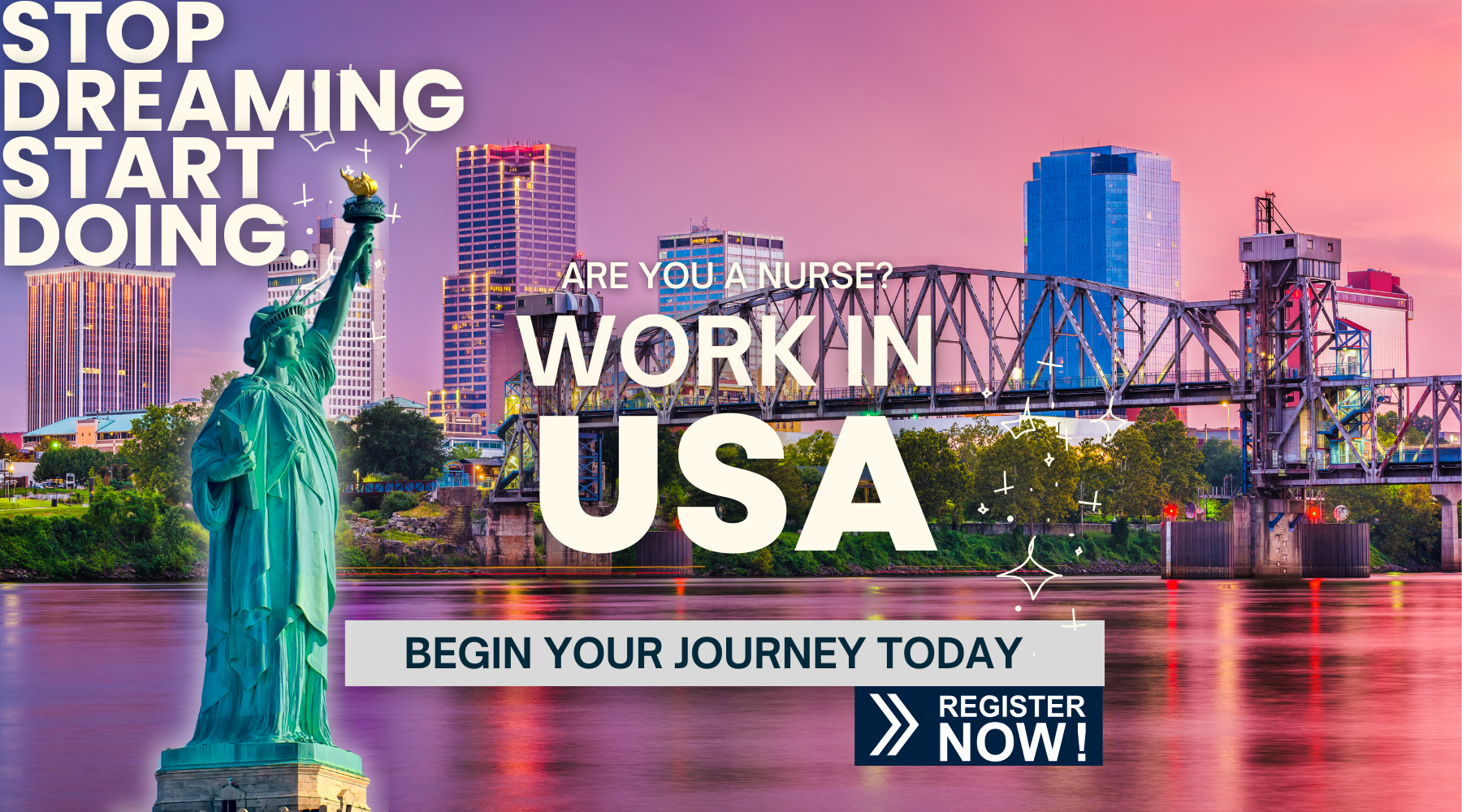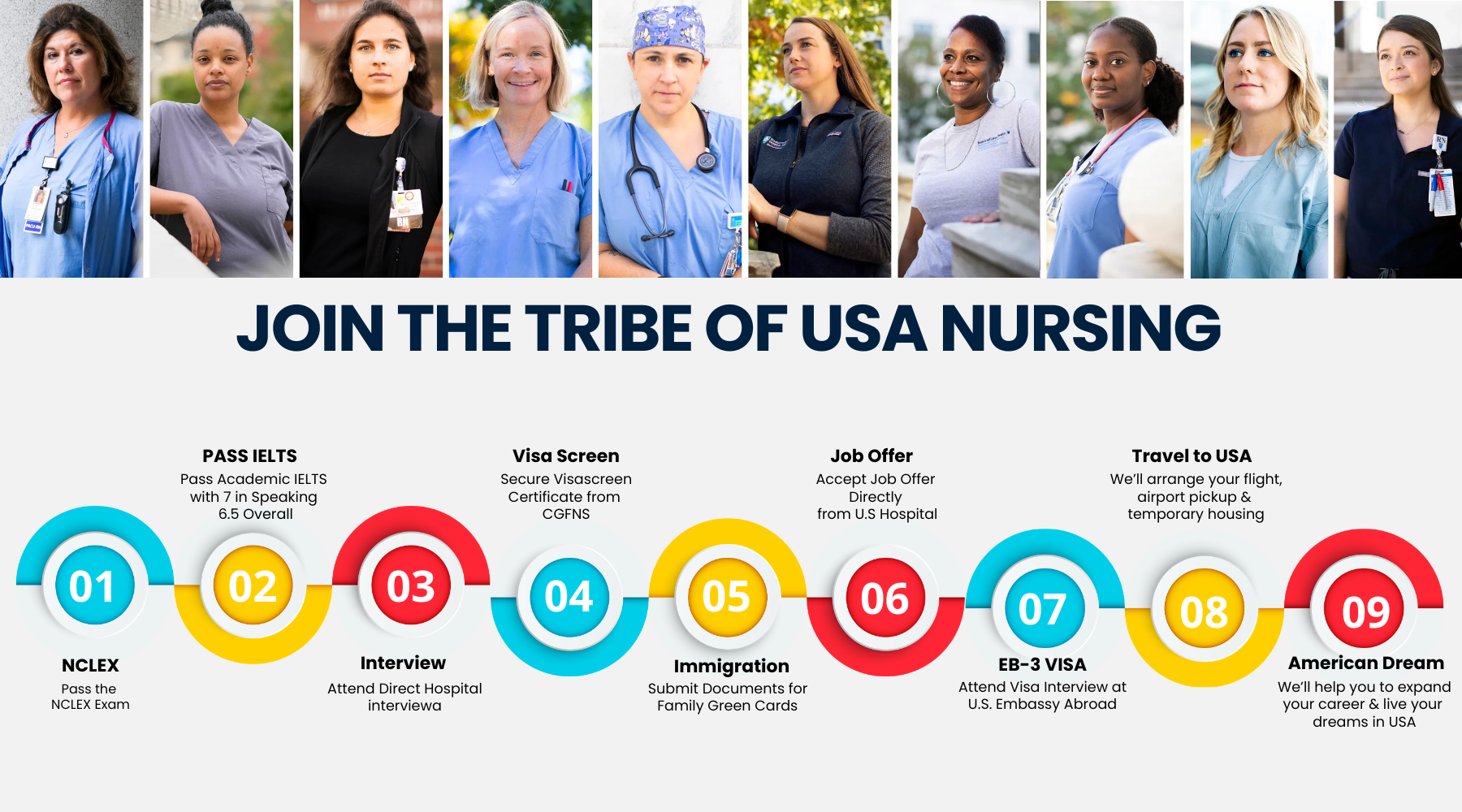Embark On Your Nursing Career In The USA
The United States offers unparalleled opportunities for skilled nursing professionals, with a dynamic healthcare landscape and rewarding career paths. At Worldify Overseas, we’re dedicated to guiding international nurses through every step of their journey to practice in the USA.
About The USA Healthcare Landscape
The U.S. healthcare system is renowned for its advanced medical technology, diverse patient populations, and emphasis on specialized care. Nurses are the backbone of this system, playing a critical role in patient care across a variety of settings, from major hospitals and specialized clinics to community health centers and home care. The demand for qualified nurses remains consistently high, offering a stable and fulfilling career with continuous professional development opportunities.
Eligibility Criteria For International Nurses
To pursue a nursing career in the USA, international nurses generally need to meet the following key criteria:
- Educational Qualification: Possess a nursing diploma or degree (e.g., Bachelor of Science in Nursing – BSN) from an accredited institution. A BSN is often preferred, though some pathways exist for those with an Associate Degree in Nursing (ADN) or diploma. Your credentials will undergo evaluation to ensure comparability with U.S. standards.
- English Language Proficiency: Demonstrate strong English communication skills. This is typically proven by achieving a satisfactory score on standardized tests such as:
- IELTS Academic: Generally, an overall score of 6.5 or higher, with specific minimums in each band (e.g., 6.0 in Listening, Reading, Writing, and 7.0 in Speaking).
- OET (Occupational English Test): A score of B in Speaking and C+ in Listening, Reading, and Writing.
- NCLEX-RN Examination: Pass the National Council Licensure Examination for Registered Nurses (NCLEX-RN). This is a standardized exam required for all aspiring registered nurses in the U.S., assessing your readiness to practice safely and competently.
- State Board of Nursing Requirements: Fulfill the specific licensing requirements of the state where you intend to practice. Each U.S. state has its own Board of Nursing with unique regulations, including background checks and possibly additional coursework or clinical hours for international graduates.
- Relevant Clinical Experience: While not always a strict requirement for initial licensure, most employers prefer candidates with a minimum of 1-2 years of recent clinical experience in a relevant nursing specialty.
Average Salary In The USA
The United States offers competitive salaries for nurses, which can vary significantly based on location, experience, educational qualifications, specialty, and the type of healthcare facility.
As of 2025, the average annual salary for a Registered Nurse (RN) in the USA is approximately $85,000 to $95,000. Entry-level positions may start around $65,000 – $70,000 annually, while highly experienced nurses or those in specialized roles can earn well over $120,000, and even up to $150,000+ in high-demand areas or advanced practice roles.
Top-paying states for nurses often include California, Hawaii, Oregon, Massachusetts, and Alaska.
Documents Required
While specific requirements may vary, here’s a general list of documents typically needed for your nursing application process in the USA:
- Educational Transcripts and Certificates: Official academic records from your nursing program.
- Nursing License/Registration: Proof of current and active nursing license from your home country.
- Passport: A valid international passport.
- English Language Proficiency Scores: Official IELTS or OET score reports.
- Curriculum Vitae (CV) / Resume: A detailed professional resume outlining your education, clinical experience, and skills.
- Letters of Recommendation: Professional references, often from supervisors or instructors.
- Credential Evaluation Report: A report from an approved agency (like CGFNS – Commission on Graduates of Foreign Nursing Schools) evaluating your foreign nursing education against U.S. standards.
- NCLEX-RN Pass Certificate: Proof of passing the NCLEX-RN exam.
- Visa-Related Documents: Depending on the visa type (e.g., EB-3 immigrant visa), additional documents such as birth certificates, marriage certificates (if applicable), and financial statements will be required.
- Police Clearance Certificate: A recent police conduct certificate from your home country.
- Medical Examination Report: As part of the visa process.

Benefits For Nurses In The USA
A nursing career in the USA comes with a wealth of benefits beyond competitive salaries:
- High Earning Potential: Strong salaries and opportunities for increased income through experience, specialization, and advanced degrees.
- Job Security and Demand: The U.S. faces a persistent nursing shortage, ensuring excellent job stability and continuous opportunities.
- Professional Growth and Development: Access to world-class continuing education, specialized certifications, and advanced degree programs (MSN, DNP) often supported by employers.
- Diverse Work Environments: Opportunities to work in a wide range of settings including hospitals, clinics, schools, research facilities, and community health.
- Flexible Scheduling Options: Many facilities offer varied shifts (e.g., three 12-hour shifts per week) providing a better work-life balance.
- Comprehensive Benefits Packages: Typically include health, dental, and vision insurance for nurses and their families, paid time off, retirement plans (401k), and sometimes life insurance.
- Career Advancement: Clear pathways to leadership roles, nurse education, advanced practice roles (Nurse Practitioner, Clinical Nurse Specialist), and research.
- Relocation and Sign-on Bonuses: Many employers offer attractive incentives to recruit and retain nurses, especially in high-demand areas.
- Technologically Advanced Healthcare: Work with cutting-edge medical technologies and innovative treatment approaches.
Reasons For The Shortage Of Nurses In The USA
The ongoing shortage of nurses in the USA is driven by a confluence of factors, creating a robust demand for international nursing talent:
- Aging Population: A rapidly growing elderly population requires more complex and prolonged healthcare services, increasing the overall demand for nursing care.
- Aging Nursing Workforce: A significant portion of the current nursing workforce is nearing retirement age, leading to a wave of experienced nurses leaving the profession.
- Nurse Burnout and Stress: The demanding nature of the profession, exacerbated by the recent global health crisis, has led to increased burnout and some nurses leaving the field prematurely.
- Shortage of Nurse Educators: A lack of qualified nursing faculty limits the capacity of nursing schools to admit and graduate more students, creating a bottleneck in the supply of new nurses.
- Increased Demand for Healthcare Services: Advances in medical technology and broader access to healthcare services mean more people are seeking treatment, further fueling the need for nurses.
- High Patient Acuity: Patients admitted to hospitals today often have more complex conditions, requiring a higher level of intensive nursing care.

Process Of Applying
The journey to becoming a registered nurse in the USA involves several key steps:
- Credential Evaluation: Your nursing education and qualifications are assessed by an approved organization like CGFNS International to ensure they meet U.S. standards.
- NCLEX-RN Preparation and Examination: Prepare for and pass the NCLEX-RN exam. This critical step demonstrates your clinical competency.
- State Board of Nursing Application: Apply for licensure with the specific State Board of Nursing where you wish to practice, submitting all required documentation and undergoing background checks.
- English Language Proficiency Test: If applicable, take and pass a recognized English language proficiency test (IELTS or OET).
- Secure a Job Offer and Visa Sponsorship: Obtain a job offer from a U.S. healthcare facility that is willing to sponsor your work visa (commonly the EB-3 immigrant visa for permanent residency).
- Visa Application Process: Work with your sponsoring employer and immigration legal team to prepare and submit your visa petition and attend the necessary interviews.
- Relocation and Onboarding: Upon visa approval, prepare for your move to the USA and begin your exciting new role.
At Worldify Overseas, we provide comprehensive support at each of these stages, ensuring a streamlined and successful transition.
FAQs For Nurses Considering The USA
Q1: How long does the entire process typically take?
The timeline can vary significantly, usually ranging from 1.5 to 3 years, depending on individual circumstances, visa processing times, and how quickly you complete each stage (e.g., NCLEX preparation, document gathering).
Q2: Do I need a Bachelor of Science in Nursing (BSN) to work in the USA?
While an ADN or diploma may be sufficient for initial licensure in some states, a BSN is increasingly becoming the industry standard and is often preferred by employers for greater career mobility and advancement opportunities. Many nurses with ADN or diploma degrees pursue BSN completion programs after they start working in the USA.
Q3: Is the NCLEX-RN exam difficult for internationally trained nurses?
The NCLEX-RN is a rigorous exam that requires thorough preparation. It assesses critical thinking and clinical judgment, rather than just rote memorization. However, with dedicated study and preparation, international nurses successfully pass the exam. Worldify Overseas can connect you with excellent preparation resources.
Q4: Can my family accompany me to the USA?
Yes, if you are applying for an immigrant visa (like the EB-3), your spouse and unmarried children under the age of 21 are typically eligible to apply for immigrant visas to accompany you.
Q5: What is the role of CGFNS International?
CGFNS (Commission on Graduates of Foreign Nursing Schools) is a non-profit organization that evaluates the credentials of internationally educated healthcare professionals. Many U.S. State Boards of Nursing require a CGFNS report or certification to determine if your education is comparable to U.S. standards before you can sit for the NCLEX-RN. They also offer the VisaScreen® service, which is often required for immigrant visas.
Q6: Are there specific states that are easier for international nurses to get licensed in?
Some states are generally considered more accessible for international licensure due to their specific Board of Nursing requirements or processing times. However, the best state for you will also depend on your career goals and preferences. Worldify Overseas can advise you on state-specific requirements.
Q7: What kind of support can Worldify Overseas offer?
Worldify Overseas provides end-to-end support, including initial profile assessment, guidance on credential evaluation and NCLEX preparation, assistance with securing job offers and visa sponsorship, and comprehensive support throughout the entire immigration process. Our goal is to make your transition to the USA seamless and successful.
